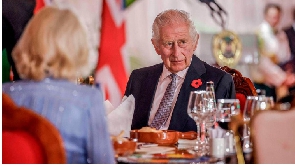 Britain's King Charles III attends the state banquet hosted by Kenyan President William Ruto
Britain's King Charles III attends the state banquet hosted by Kenyan President William Ruto
United Kingdom's King Charles III says he is using his country’s colonial history in Kenya to drive lessons that could boost ties, signaling how the relations between the two countries were shaped by the past.
In a speech at a state banquet in Nairobi, prepared in his and Queen Camilla’s honour, the British monarch avoided the apology demanded by activists and relatives of those maimed or killed during the colonial era. But he said that moment in history is important to direct the future relations of Kenya and the United Kingdom, regretting some of the brutal incidents of the colonial governors.
Although much of today’s relations between Kenya and the UK is banked on trade, investments and security cooperation, King Charles did admit learning from past errors can help avoid future mistakes in “a partnership of equals”.
“The wrongdoings of the past are a cause of the greatest sorrow and the deepest regret. There were abhorrent and unjustifiable acts of violence committed against Kenyans as they waged…a painful struggle for independence and sovereignty – and for that, there can be no excuse.
“In coming back to Kenya, it matters greatly to me that I should deepen my own understanding of these wrongs, and that I meet some of those whose lives and communities were so grievously affected.”
King Charles III is on a state visit to Kenya alongside his wife Queen Camilla. Ahead of the trip, he had been under pressure to apologise for the pre-independence clamp-down by the British colonial government on Kenyan freedom fighters which included torture and killings. He had also been under pressure to acknowledge and promise justice to victims of misdeeds by British soldiers still training in Kenya under a bilateral agreement.
The Kenya Human Rights Commission, for instance had issued an open letter on October 29 in which it asked the King to “acknowledge its historical responsibilities and collaborate with Kenya” to address the demands for justice.
But at the dinner on Tuesday night, the King maintained London’s stance: Regret, not apology.
His host President William Ruto said the monarch had demonstrated “exemplary courage” even though he said a lot remains to be done to atone for the brutal era “in order to achieve full reparations.”
Ruto said Kenya and the UK should not deny their checkered history but should not also be enslaved by it.
“Neither can we go far into the future if we turn our backs on historical actions and omissions whose legacies encumber our present,” Ruto said.
“I am optimistic that through the Kenya-UK partnership, we shall keep up our endeavour to inspire the change we hope for by making people and their well-being the fundamental consideration in our pursuit of trade and investment, defence and security, conservation and climate action, research, development and innovation as well as our work of designing a future that works for present generations and distant posterity."
In the past, Britain expressed regret and paid about $24.3 million in 2013 to a group of Maumau veterans who said they suffered the brutality in the colonial Emergency between 1952 and 1960.
In Nairobi, Charles said no regret could change the past. “But by addressing our history with honesty and openness, we can perhaps demonstrate the strength of our friendship today. And, in so doing, we can, I hope, continue to build an ever-closer bond for the years ahead."
The two sides say they have outgrown dependency and are venturing in areas that help both sides.
The monarch said it is a “modern partnership of equals, facing today’s challenges, and looking to the many opportunities that, together, we can seize”.
Those challenges include climate change and security.
“Whether by using the King’s Cross regeneration as a model for the Nairobi Railway City, or by learning from Kenya how the Blue Economy can really work for local communities, all of you here this evening, and across our countries, deserve our gratitude for your ceaseless work to realise our joint ambitions.
Earlier, King Charles and Queen Camilla were taken to Uhuru Gardens where Kenya’s new museum of history was opened. They saw statues of freedom fighters Dedan Kimathi and Mekatilili wa Menza.
On Wednesday, they are expected to tour the Karura Forest, one of the emblems of the activism of Kenya’s environmental hero, the late Wangari Maathai, who won the Nobel Peace Prize in 2004.